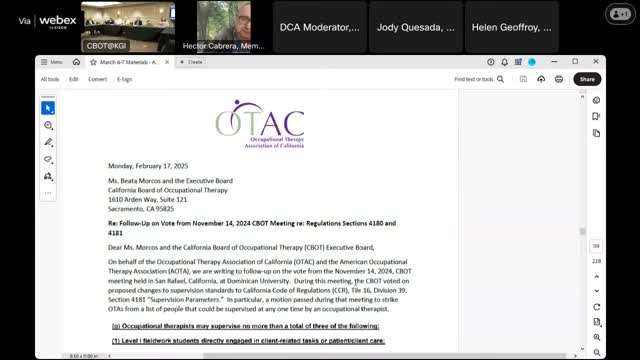California OT board leans toward continuing-education requirement over jurisprudence exam
Get AI-powered insights, summaries, and transcripts
Subscribe
Summary
Board members debated requiring a jurisprudence exam for licensees but indicated a preference for a continuing-education (CE) approach and directed staff to draft regulatory language and return with options.
Members of the California Board of Occupational Therapy discussed whether to require licensees to demonstrate knowledge of state law through a jurisprudence exam or a continuing-education requirement during their March 7 meeting. After extended debate, board members and stakeholders signaled a preference for a CE-based approach with staff-directed follow-up rather than immediate adoption of an exam.
The discussion opened when the board considered agenda item 14, “discussion and possible actions and required professional development units pertaining to the board’s laws and regulations.” Board member Richard Bookwalter argued in favor of a formal jurisprudence exam, citing enforcement experience and gaps in licensees’ knowledge of state law: “I’ve said for a long time that I think we have we need to have a jurisprudence exam,” he said.
Other board members expressed concern about the exam’s cost and administrative burden. Elizabeth Dietzen Olsen, regulations counsel, advised the board that adopting an exam contract can trigger audits and additional regulatory oversight. Board members noted examples from other states and cited budget constraints as a factor in their deliberations.
Stakeholders at the meeting offered alternatives. Sami Rafidi, president of the Occupational Therapy Association of California (OTAC), offered OTAC’s support for providing CE if the board adopts that path: “OTAC would love to be the go to for this continuing education and partner with CBOT, to make these happen,” she said. Kristin Neville, state affairs manager for the American Occupational Therapy Association (AOTA), also supported collaboration on CE materials and emphasized remote access for stakeholders.
Following discussion, staff said they would draft possible regulatory language options — including a CE-based jurisprudence requirement, an interim attestation option, and the exam route — and return with the language for further board consideration. The board indicated staff should present draft regulatory language and implementation scenarios at a future meeting (staff indicated June as the target for further materials).
The board did not take a formal vote on whether to adopt an exam or a CE requirement at the March 7 meeting; the session was a policy-level discussion and staff follow-up was the next step.
The debate touched on several practical questions: cost and contracting for an exam vendor, whether a required CE course would be available immediately or developed by third-party providers, whether an attestation should be allowed as an interim measure, and how much of the CE requirement—if adopted—should be specifically tied to California law versus broader topics like ethics or cultural competence. Board members also discussed timing and the regulatory process; counsel reminded the group that new regulations require publication and Office of Administrative Law review before becoming effective.
